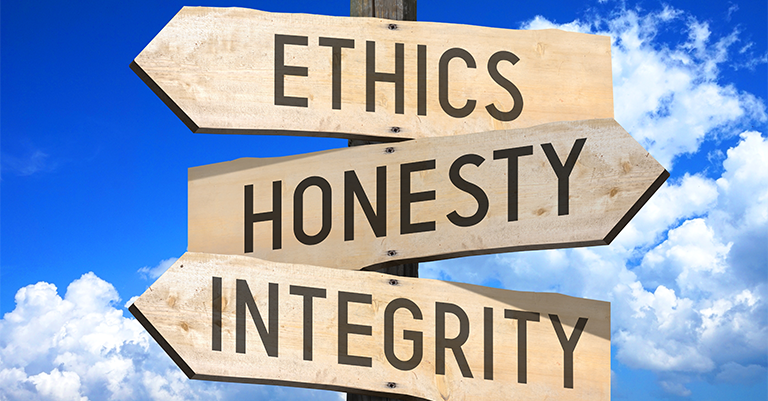Ethical leadership isn’t just about doing the right thing when it’s easy. It involves consistently acting in ways that reflect honesty, fairness, and accountability, even when it’s hard. Leaders who prioritize ethical behavior build trust among their teams and foster a culture where integrity thrives.
The true strength of an ethical leader is seen in how they handle challenges. When faced with difficult decisions, they rely on their values to guide them. This creates a ripple effect that positively influences every level of an organization. Ethical leaders know that their actions set the tone for the entire team.
By leading with ironclad integrity, leaders can create a foundation for long-term success.
The Core Values of Ethical Leadership

Ethical leadership is grounded in a set of core values that serve as a leader’s moral compass. Among these values, integrity stands out as the most crucial. Without integrity, trust and respect can quickly erode, leading to a dysfunctional team. Ethical leaders prioritize these values because they understand their lasting impact.
Integrity as a Cornerstone
Integrity is more than just honesty. It’s about aligning actions with values. Leaders with integrity don’t take shortcuts or compromise their principles, even when under pressure. They understand that the way they act when no one is watching speaks volumes.
When leaders lead with integrity, they inspire others to do the same. Team members feel more confident in following a leader who is transparent and trustworthy. This creates a healthy and open environment where individuals feel safe to express their concerns and ideas.
Building Trust with Ethical Decisions
Trust is the currency of leadership, and ethical decisions are the key to earning it. Leaders must make decisions that prioritize the well-being of their team and the broader community. When leaders act ethically, they signal that they value fairness and respect, which strengthens trust across all relationships.
Ethical decisions also show that leaders care about long-term outcomes, not just short-term gains. This approach fosters a sense of stability within the organization, giving employees confidence in their leaders’ vision.
Empathy in Leadership
Empathy is a vital core value for ethical leaders. It involves understanding and sharing the feelings of others, allowing leaders to connect with their team on a deeper level. When leaders are empathetic, they can better relate to the challenges and concerns their employees face. This not only strengthens relationships but also fosters a sense of belonging and trust within the team.
Empathy helps leaders make decisions that consider the well-being of everyone involved. By prioritizing the needs of others, leaders demonstrate that they value their team’s contributions and emotional health. This compassionate approach encourages a supportive and collaborative work environment.
Fairness in Decision-Making
Fairness is essential in ethical leadership because it ensures that decisions are made impartially and without favoritism. Leaders who value fairness treat everyone equally, giving each team member the same opportunities and respect. This creates a culture where employees feel valued for their skills and efforts, rather than personal connections or biases.
A fair leader listens to all sides before making a decision, ensuring that outcomes are just and reasonable. By prioritizing fairness, leaders build credibility and trust within their organization, promoting a positive and harmonious work environment.
Leading by Example: The Importance of Role Models in Leadership

Ethical leaders recognize that actions speak louder than words. Leading by example means consistently demonstrating the values that you want your team to embrace. When leaders act with integrity, fairness, and empathy, it creates a ripple effect throughout the organization.
Employees look to their leaders for cues on how to behave. If a leader demonstrates ethical behavior, it becomes easier for others to follow suit. This not only strengthens the team but also builds a culture of accountability. Ethical leadership is about showing, not just telling. It’s about being the role model your team needs.
Demonstrating Ethical Behavior Consistently
To lead by example, ethical leaders must consistently display the behaviors they want their team to follow. This means showing integrity in daily actions, whether in small decisions or major initiatives. Consistency builds trust, as team members know their leader will always uphold the same ethical standards. When leaders demonstrate honesty, fairness, and accountability in every situation, it becomes clear to the team what is expected of them.
Consistency also means being reliable and dependable. Ethical leaders don’t compromise their values for short-term gains or convenience. By sticking to their principles, they set a strong example for others to emulate.
Empowering Others to Follow Ethical Practices
Leaders who model ethical behavior empower their team to do the same. By showing how ethical decisions can lead to positive outcomes, they encourage their employees to adopt similar values. Leaders can foster this behavior by providing guidance, recognizing ethical actions, and offering support when tough choices arise.
Empowering others also means giving them the confidence to speak up when they see unethical behavior. When a leader promotes a culture of integrity, employees feel safe in raising concerns and know they will be heard. This open environment strengthens the entire organization and reinforces ethical practices at every level.
How Ethical Leadership Impacts Organizational Culture

Ethical leadership has a profound impact on the culture of any organization. When leaders uphold ethical standards, they encourage their team to do the same. This leads to a positive, supportive work environment where fairness and respect are the norm.
Accountability and Transparency
Ethical leaders are accountable for their actions, and they expect the same from their team. They don’t shy away from taking responsibility, even when mistakes are made. This creates a transparent environment where honesty is valued, and problems are addressed openly.
Transparency, in turn, builds trust. When team members know their leaders are honest and accountable, they feel more comfortable sharing their own ideas and concerns.
Promoting Ethical Behavior Among Teams
Promoting ethical behavior is more than setting rules. It’s about creating a culture where ethical behavior is the norm, not the exception. Leaders do this by encouraging open communication, recognizing ethical actions, and addressing unethical behavior promptly.
When leaders make ethics a priority, team members are more likely to act in ways that align with the organization’s values. This creates a cohesive team that works together toward common goals with integrity.
Fostering Open Communication
Ethical leadership fosters a culture of open communication, where team members feel comfortable sharing their thoughts and concerns. Leaders who prioritize transparency encourage honest dialogue and ensure that everyone has a voice. This openness helps identify potential issues early and promotes collaboration in solving problems.
When leaders actively listen to their team and create a safe space for discussion, employees are more likely to contribute their ideas and feedback. This leads to better decision-making and a more engaged, motivated workforce.
Encouraging Responsibility at All Levels
Ethical leaders encourage responsibility across all levels of the organization. They expect accountability not just from themselves but also from their team. When everyone understands their role and takes ownership of their actions, the organization functions more effectively.
Leaders set the tone by holding themselves responsible for their decisions and outcomes. This example inspires employees to follow suit, creating a culture where responsibility is shared and valued. It also reduces blame-shifting, as team members know they are accountable for their work, leading to higher overall performance.
Overcoming Challenges in Ethical Leadership

While ethical leadership is crucial, it isn’t always easy. Leaders often face tough decisions where the right choice isn’t clear. They may also encounter resistance from individuals who prioritize profit or convenience over ethics. However, ethical leaders remain steadfast in their values.
Overcoming these challenges requires strong moral courage. Leaders must stay committed to their principles, even when it’s uncomfortable. This may involve difficult conversations, but the rewards of maintaining integrity are far-reaching. Teams that see their leaders standing firm in their values are more likely to respect and follow them.
Maintaining Ethical Standards Under Pressure
One of the greatest challenges in ethical leadership is maintaining integrity when faced with pressure. Whether it’s pressure to meet financial goals, deadlines, or external expectations, leaders may feel tempted to compromise their values. However, true ethical leadership means sticking to principles, even when it’s difficult. By remaining committed to honesty and fairness, leaders can navigate challenges without sacrificing their ethics.
Leaders who prioritize ethical standards under pressure also set an example for their team. Employees are more likely to respect and follow a leader who refuses to cut corners or engage in unethical practices, even when under stress.
Addressing Unethical Behavior Promptly
Another challenge ethical leaders face is dealing with unethical behavior within the organization. It can be uncomfortable or challenging to confront employees or colleagues about misconduct. However, ethical leadership requires addressing these issues directly and swiftly. Ignoring unethical actions can undermine the leader’s credibility and harm the organization’s culture.
By taking action when unethical behavior arises, leaders demonstrate their commitment to maintaining a fair and just environment. This not only resolves immediate issues but also reinforces ethical expectations for the entire team.
Balancing Profit with Ethical Decision-Making
Ethical leadership often involves balancing financial success with moral obligations. Leaders may face situations where profit-driven decisions conflict with ethical values. Making the right choice in these cases can be difficult, especially when stakeholders or investors prioritize short-term gains. Ethical leaders, however, focus on long-term success by making decisions that align with their values.
This approach may require tough calls, such as turning down opportunities that don’t align with the organization’s ethical standards. However, by prioritizing integrity over immediate profit, leaders build a sustainable, respected organization that thrives on trust and ethical practices.
Final Thoughts: Embracing Integrity as a Leadership Priority

In the end, ethical leadership is about more than just making the right decisions. It’s about creating an environment where integrity is the foundation of every action, no matter how big or small. When leaders consistently model ethical behavior, they set the tone for the entire organization, creating a culture where trust, honesty, and accountability are the norm.
Leaders who prioritize integrity empower their teams to follow suit. This leads to stronger relationships, higher morale, and a shared sense of purpose. Employees feel safe knowing that they work in an environment where fairness and transparency are valued. This fosters open communication, collaboration, and innovation, all of which are vital to long-term success.
By leading with ironclad integrity, ethical leaders inspire trust, accountability, and a culture where everyone feels valued and respected. These leaders not only navigate challenges with confidence but also build a legacy of trust that extends far beyond their immediate actions. When integrity is at the core of leadership, it creates a ripple effect that positively impacts the entire organization, setting the stage for sustainable growth and success.
Ultimately, embracing integrity as a leadership priority is the key to building not just a great team but a thriving organization. Leaders who remain committed to ethical principles inspire their teams to reach their full potential, creating a lasting impact that benefits both individuals and the organization as a whole.




